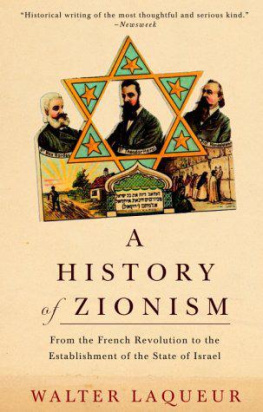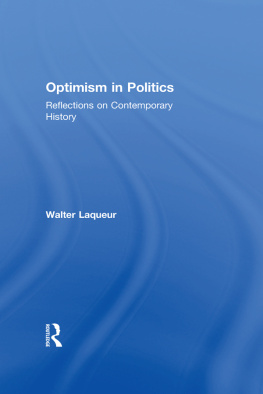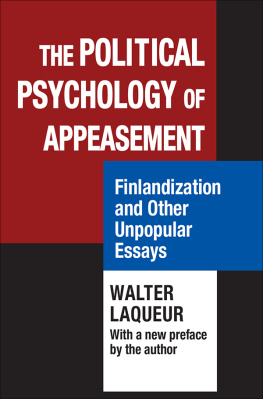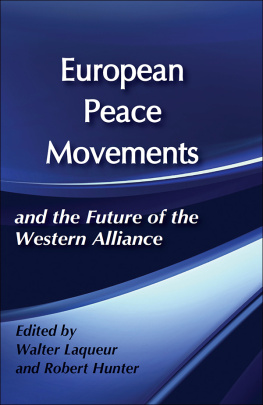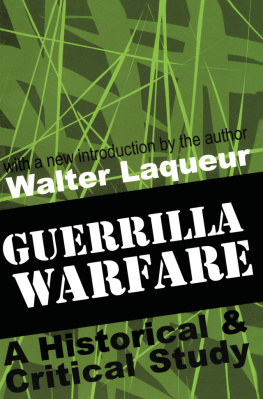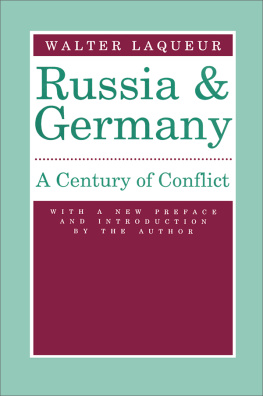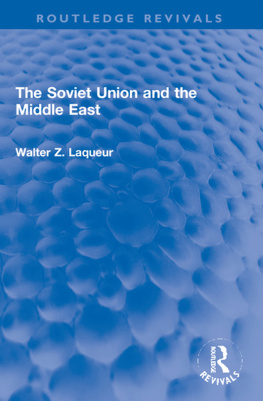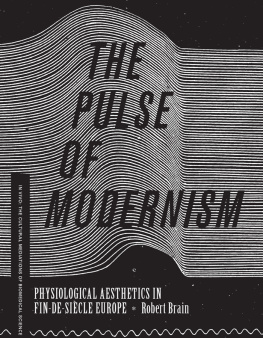Fin de Sicle
AND OTHER ESSAYS ON
America & Europe
First published 1997 by Transaction Publishers
Published 2017 by Routledge
2 Park Square, Milton Park, Abingdon, Oxon OX14 4RN
711 Third Avenue, New York, NY 10017, USA
Copyright 1997 by Taylor & Francis
Routledge is an imprint of the Taylor & Francis Group, an informa business
All rights reserved. No part of this book may be reprinted or reproduced or utilised in any form or by any electronic, mechanical, or other means, now known or hereafter invented, including photocopying and recording, or in any information storage or retrieval system, without permission in writing from the publishers.
Notice:
Product or corporate names may be trademarks or registered trademarks, and are used only for identification and explanation without intent to infringe.
Library of Congress Catalog Number: 96-33084
Library of Congress Cataloging-in-Publication Data
Laqueur, Walter, 1921-
Fin de sicle and other essays on America and Europe / Walter Laqueur.
p. cm.
Includes bibliographical references and index.
ISBN 1-56000-261-1 (alk. paper)
1. RadicalismEuropeHistory20th century. 2. EuropePolitics and
government1989- . 3. RadicalismRussia
(Federation). 4. Russia (Federation)Politics and government1991- . 5. Post-communism.
6. World politics1989- . I. Title.
HN380.Z9R347 1996
320.9049dc20
96-33084
CIP
ISBN 13: 978-1-56000-261-1 (hbk)
Acknowledgements
Fin de Sicle reprinted from Journal of Contemporary History, January 1996 by permission, all rights reserved. The same applies to the following articles:
Berlin and Moscow 1914 appeared originally in the catalogue of the Berlin-Moscow Exhibition, Berlin 1995.
The Long Way to Europe was first published as an introduction to W. Mommsen (ed.) The Long Way to Europe, edition q. Newton Conn. 1993.
Public Diplomacy, Poor Relation appeared first in Foreign Affairs, October 1994.
Russian Nationalism in Foreign Affairs, Winter 1992/3.
Preparing for the Next Century in Partisan Review, Winter 1994.
Post Fascism, Post Communism in Partisan Review, July 1995.
Feuchtwanger and Gide in Partisan Review, Fall 1992.
Family Reunion in Commentary, July 1994.
Splendor and Misery of Sovietology part one and two, New Times, (Moscow), August 1992.
In Praise of Menshevism in Novoe Vremya, 11 January 1992.
Russian Nationalism (1) was published in the New Republic, November 1990, part two appeared in Russian as a preface to the Russian edition of Black Hundred, Moscow, 1994.
The End of the Cold War appeared in German in H.P. Schwarz and K. Kaiser, Die Neue Weltpolitik, Bonn, 1995.
The essay on Sakharov is reproduced here by permission of Brandeis University Press.
The Empire Strikes Out New Republic, 15 September 1991.
The Essay on Maxim Gorky was not published previously.
The Congress for Cultural Freedom appeared first in Partisan Review, Spring 1996.
On Victory in Europe Day General de Gaulle, in a pensive mood, went to the Arc de Triomphe to salute the Tomb of the Unknown Soldier and the chroniclers reported one of his famous asides: Comme ils sont obscurs les lendemains de la France.
This ought to be the motto of the present book but for the fact that it refers not just to France. When the Soviet Empire collapsed and the cold war came to an end there had been a general rejoicing similar to the celebrations after World Wars I and II and, of course, for good cause. The walls dividing East and West had at last come down, the threat of nuclear war had been removed and the tyranny that had affected the lives of so many people had disappeared. New vistas opened up of peace, prosperity, and the pursuit of happiness.
The essays collected here all belong to the post-cold war period and if they have a common denominator it is of not joining the chorus of rejoicing. Not much foresight was needed even in 198990 to realize that Russias and Eastern Europes road to freedom would be, at best, protracted and arduous with many setbacks ahead. During the 1970s and 1980s Western scholars had engaged in acrimonious disputes as to whether the Soviet Union was an authoritarian or totalitarian state, a dictatorship qualitatively different from its predecessors. The prevailing consensus was that though it might have been totalitarian under Stalin, it had become more liberal in the subsequent decades. To some this seemed a scholastic debatewhat did labels matter? But the aftermath of communist rule has shown that there was after all, an important distinction, for if the Soviet Union and Eastern Europe had indeed been authoritarian such as, for instance, Spain under Franco, Salazars Portugal, and Chile under Pinochet, the transition to a democratic regime would have been much easier. Ten years after the reforms in the communist world, power, such as it is, is again in the hands of the communists, or of nationalists closely cooperating with communists. True, these are not old Stalinists; most of them have undergone change, but their style is still authoritarian and no one can say for certain whether this conversion to democracy is lasting. The fact that the very word democracy has become a swear word in Russia does not augur well. Given the enormous problems facing them one should not be too harsh on the incumbents, for the alternative is even worse: the rise of a red-brown alliance. Populism has emerged in Eastern Europe and the former Soviet Union and populist movements that can with equal ease turn to the extreme right and left, frequently combining the two traditions.
This trend is by no means confined to the former Soviet empire. Fundamentalism in the Middle East and North Africa as well as in other parts of the globe is heir to a militantly religious tradition. But in its practice, its monopolization of political power, terror, propaganda, its intolerance and aggressiveness, it has shown striking affinities with historical fascism. Has communism been defeated merely to open the door to a revival of that other abomination, fascism, or are we confronting a new phenomenon, a coalition of the two least savory political movements of the twentieth century?
Even in Europe the extreme right has reemerged in forcein France and Italy, in Russia and Austria these parties are among the strongest. And yet, as far as Europe is concerned (except perhaps the Balkans), there is reason for guarded optimism. Europe has been immunized to some extent to outright fascism, the new aggressiveness is directed inward. Europes status in the world is very much diminished and will continue to decline as long as there is no greater unity. With all the extremist rhetoric, even European fascism is no longer militaristic, does not want to spend a large part of its GNP on rearmament. It wants to keep foreigners out but does not wish to risk aggressive war. Perhaps the fascists too have been corrupted by the welfare state, for what is fascism without great military parades and wars of conquest? If fascism still has a future, it is not in Germany or Italy or France but rather in the more advanced regions of what used to be called the third world.



